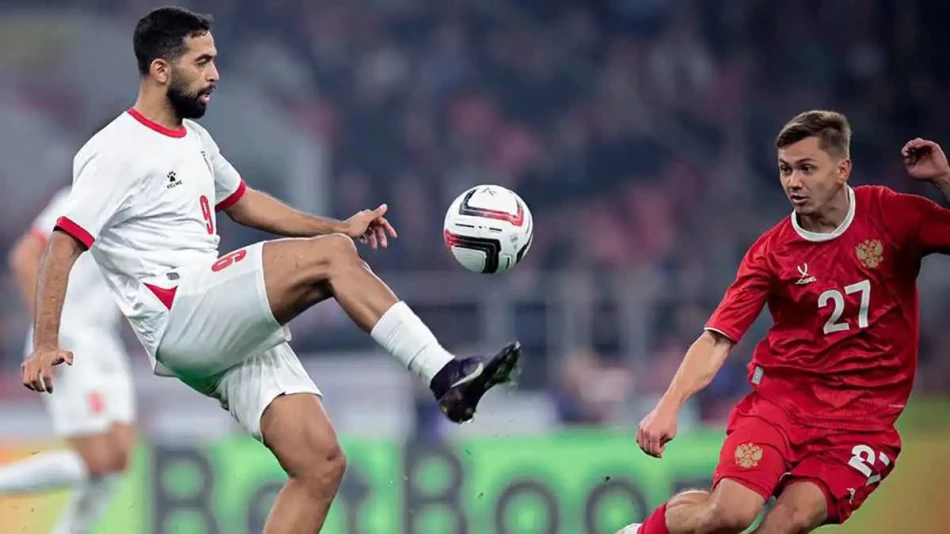
Jordan and Russia Drawn in Friendly Ahead of 2026 World Cup Preparations
Jordan's Defensive Masterclass Against Russia Signals World Cup Readiness
Jordan's national football team delivered a disciplined defensive performance in a goalless draw against Russia at Moscow's Spartak Stadium on Thursday, showcasing the tactical foundation that could serve them well at the 2026 FIFA World Cup. The result reflects Jordan's growing maturity on the international stage as they prepare for their second-ever World Cup appearance.
Tactical Battle Ends in Stalemate
The friendly match demonstrated contrasting approaches, with Jordan's "Al-Nashama" (The Brave Ones) prioritizing defensive organization and tactical discipline under Moroccan coach Jamal Sellami. Russia dominated possession and created multiple attacking opportunities but failed to break down Jordan's well-structured defensive wall.
This performance pattern has become a hallmark of Jordan's recent success—absorbing pressure while maintaining defensive shape, a strategy that proved effective during their historic World Cup qualification campaign.
Strategic Preparation for Global Stage
Building Tournament Experience
The match forms part of Jordan's intensive preparation program as they gear up for the 2026 World Cup, which will be jointly hosted by the United States, Canada, and Mexico. For a nation that only qualified for their first World Cup in 2022, these high-level friendlies against established football nations are crucial for building confidence and tactical awareness.
Sellami's Defensive Philosophy
Coach Jamal Sellami's approach mirrors successful strategies employed by other smaller nations at major tournaments. Morocco's own defensive resilience at the 2022 World Cup, where they reached the semi-finals, provides a blueprint that Jordan appears to be following. The emphasis on tactical discipline over expansive play could prove vital when facing higher-ranked opponents on the world stage.
Regional Football Development
Jordan's steady progress reflects the broader development of Middle Eastern football. Following in the footsteps of regional neighbors like Saudi Arabia and Qatar, who have invested heavily in football infrastructure and coaching, Jordan's qualification represents the region's growing competitiveness in global football.
The team's ability to secure a clean sheet against Russia—despite the latter's exclusion from major tournaments due to geopolitical issues—demonstrates that Jordan can compete effectively against European opposition. This experience will prove invaluable when they face diverse playing styles at the World Cup.
Looking Ahead to 2026
While a goalless draw might appear unremarkable, Jordan's defensive solidity against a technically superior opponent suggests they are building the foundation necessary for World Cup success. Small nations have historically achieved memorable results through defensive organization and tactical discipline—Iceland's Euro 2016 run and Croatia's 2018 World Cup final appearance serve as inspiring examples.
Jordan's approach indicates they understand their strengths and limitations, focusing on maximizing their defensive capabilities while maintaining the tactical flexibility that helped secure their World Cup qualification. As they continue their preparation, matches like this provide essential experience in executing their game plan against varied opposition styles.
Most Viewed News

 Sara Khaled
Sara Khaled






